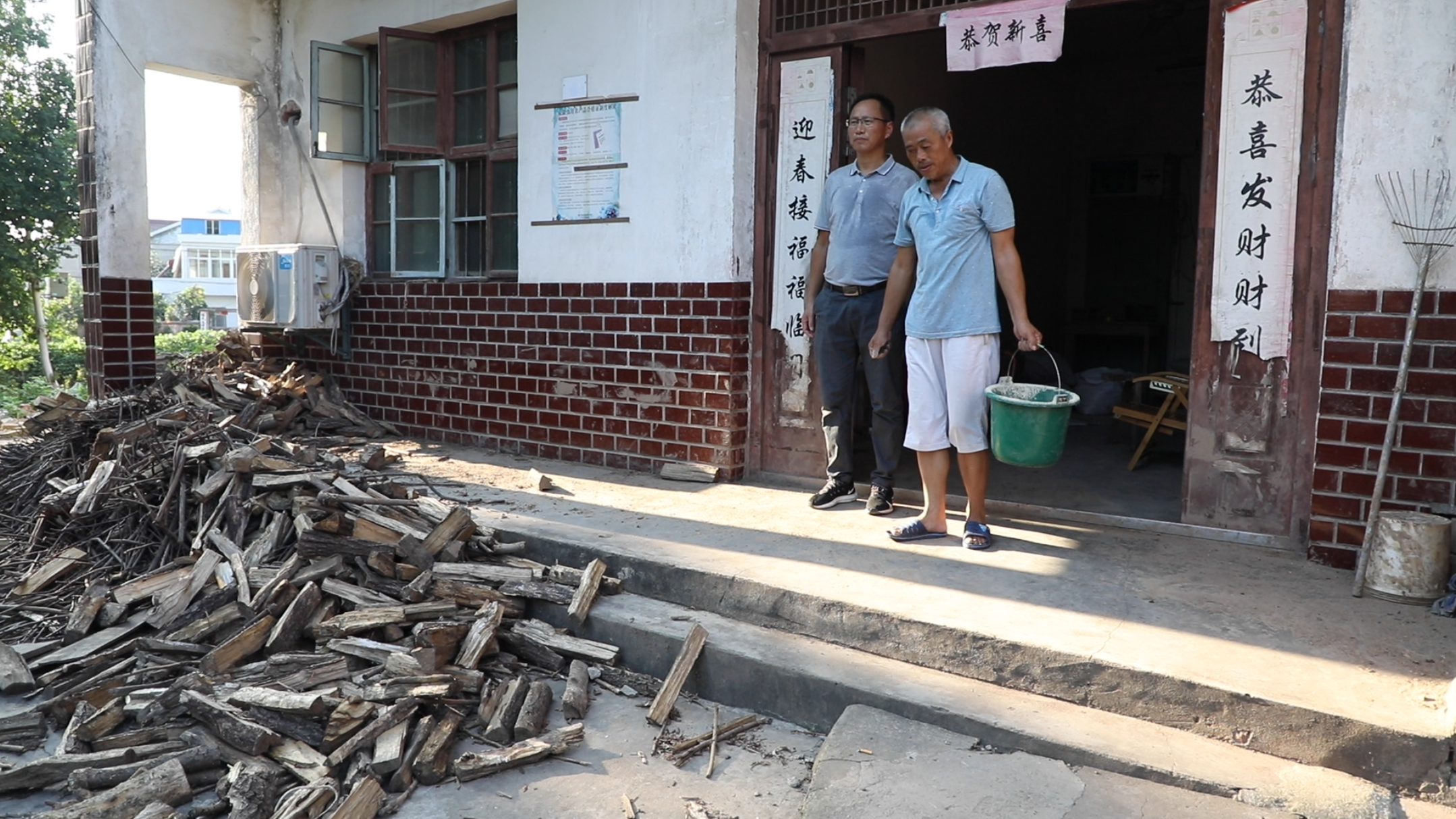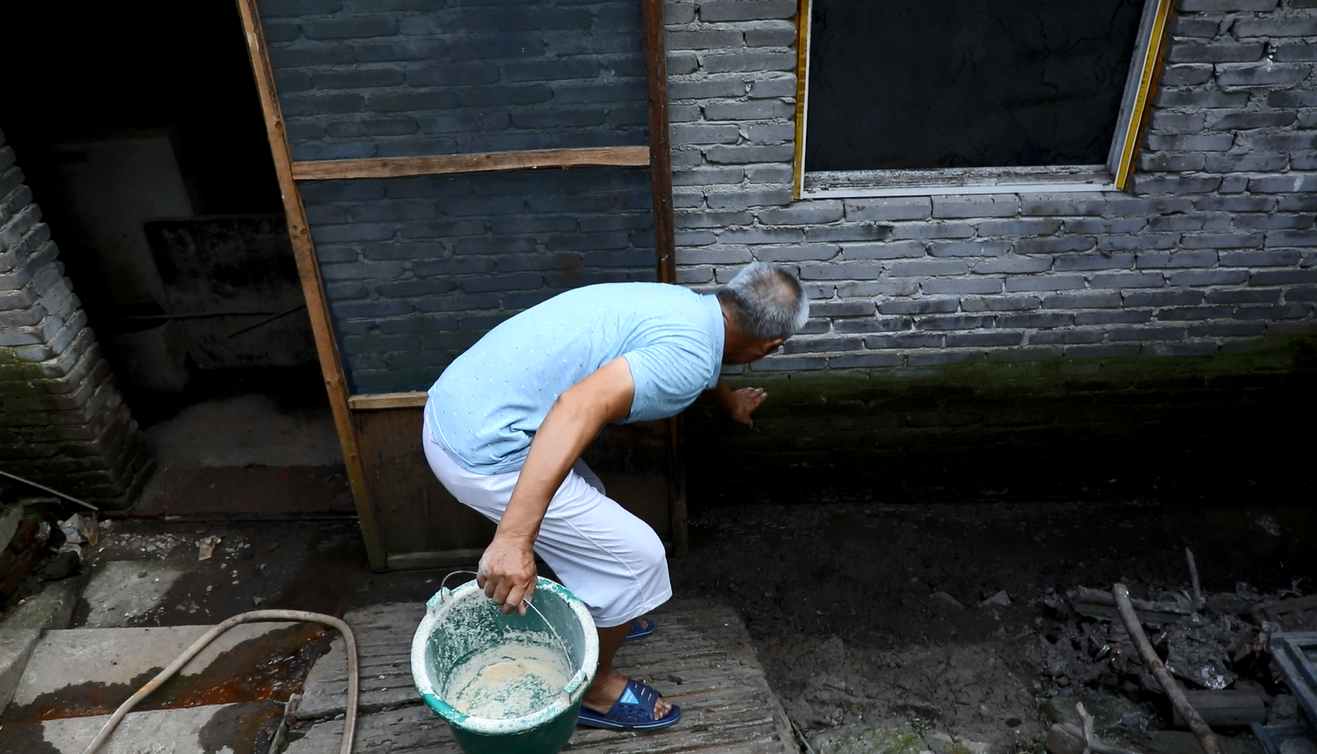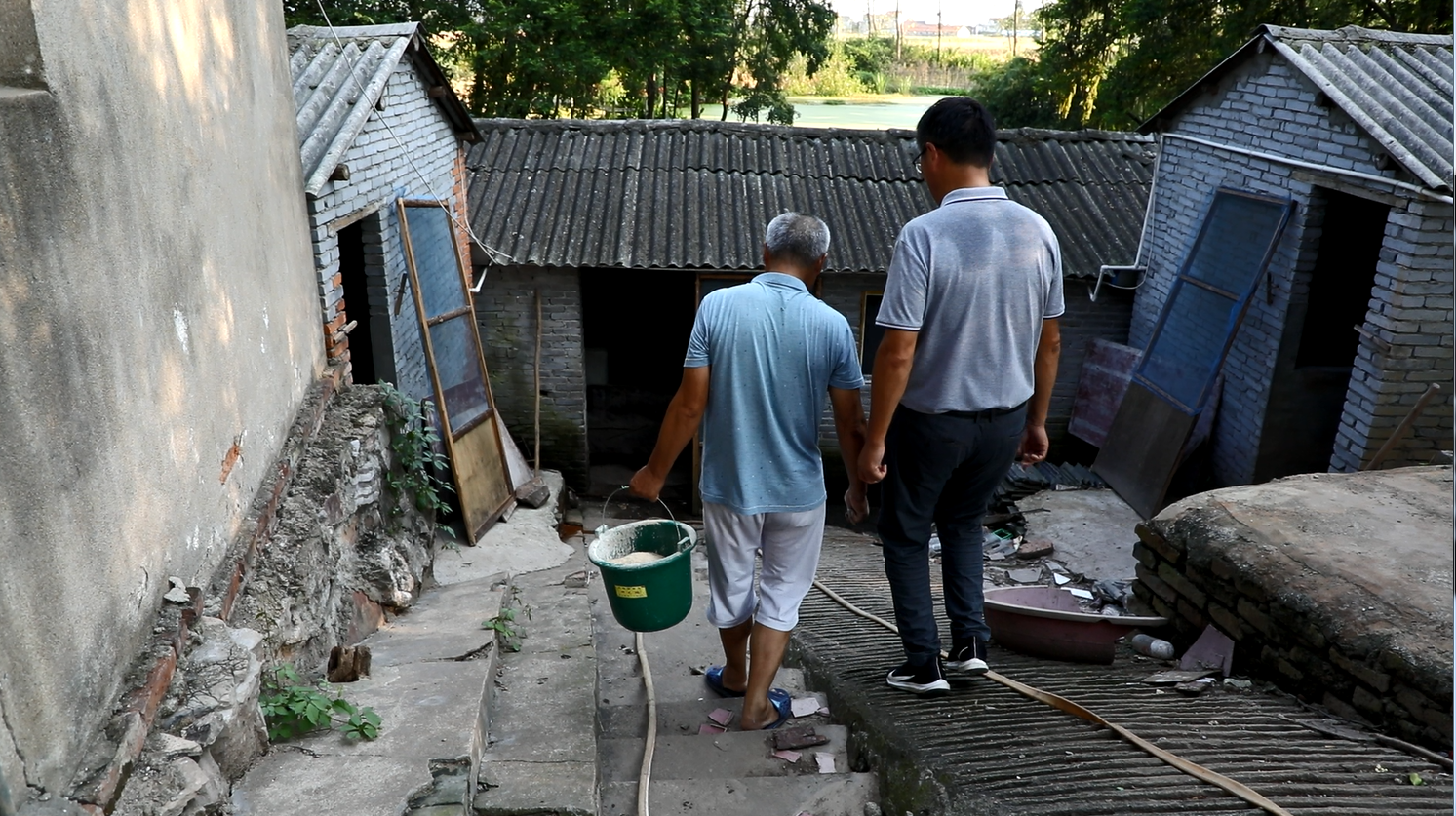Fu Xuesong, a 58-year-old farmer, is grateful that he managed to keep his 40 pigs alive after heavy floods hit his village this summer.
Inside his empty house, there was nothing but a makeshift chair and a bag of pig feed. All furniture was moved upstairs to avoid flood damage. The house was utterly quiet, and so was the village that he lived in.
Mopan Village of Wangjiang County in east China's Anhui Province was almost deserted. Perched a few dozen kilometers from a local river that feeds into the Yangtze, the village faced the threat of flooding as heavy rains pushed water levels to new highs. As floodwater inched upward in early July, all residents were required to leave and the village was sealed off.

Fu's house in Mopan Village. Qi Jianqiang/CGTN
Fu's house in Mopan Village. Qi Jianqiang/CGTN
On July 11, the night when the evacuation order came, Fu was alone at home. His wife, who suffers from a severe disability, was at a hospital in a nearby town. His son, like many young people in rural China, had left home to join the military and only comes back once a year. His family had been designated as a "poverty-stricken" household, but expects to lose that status at the end of this year as a result of China's anti-poverty campaign.
On the other side of the village, Wang Lei, a local government official, was busy going from door to door to persuade residents to leave. Though all villagers were required to evacuate, some refused to go. Many had lived there for their entire lives, and were worried that once they left, their livestock would starve to death.
Fu had a similar fear. The 40 pigs he raised provided his main income. They were the source of the money he used to build his house and the means to send his son to school. After China was hit hard by the African Swine Fever last year, pork became the new gold. Each pig is now valued at a few thousand yuan. The 40 pigs are almost invaluable to him.

Rice paddies were underwater in Wangjiang county. /courtesy of Xu Changshou
Rice paddies were underwater in Wangjiang county. /courtesy of Xu Changshou
When Wang came to the door of Fu's house, he understood the farmer's predicament. Fu had moved his belongings to the second floor but there was no way to protect his pigs, his most valuable possessions.
Still, he had to evacuate immediately. Local authorities had decided to release water from a levee upstream after water levels in the reservoir rose dramatically in just a few hours. And when the water was released, the village would be flooded.
One hour before the water was due to be released, Wang asked a colleague from the flood control and command team to assist him in moving Fu's pigs from the pig barn to a higher spot. "I know the pigs are all that the poverty-stricken farmer relies on, so I came to offer my assistance," he said.
Fu's six acres of rice paddies were submerged in the flood, and could not be protected. After weeks of heavy rainfall, the Yangtze River in Wangjiang County was at its highest recorded level, even higher than in the catastrophic flood of 1998. A dark swath of mildew is left on the wall of Fu's pig barn, signaling how high the water rose.

A dark swath of mildew is left on the wall of Fu's pig barn. Qi Jianqiang/CGTN
A dark swath of mildew is left on the wall of Fu's pig barn. Qi Jianqiang/CGTN
"We devoted a tremendous amount of money and human labor on flood control," said Wang. "From 2016 to 2020, we were hit hard by floods for four consecutive years."
The levee that shields the village from heavy flooding is shorter and less flood-resistant than many dams that are central to China's flood control efforts, according to Wang. Due to the heavy flooding this year, there was a risk water could flow over the levee or even cause a levee breach, and so all residents were required to evacuate.
Luckily, because soldiers and local officials managed to build a barrier with sandbags to stop the water, the levee did not break this year. "If not for the sandbags, the water would go as high as the first floor of buildings, and completely submerge his pig barn," said Wang.
Every day between 8 a.m. to 10 a.m., from July 12, Wang accompanied Fu to his house to feed the pigs. If the pigs were left to die because there was no one to feed them, it would be too much of a loss, he said.

Wang accompanies Fu to feed the pigs. Qi Jianqiang/CGTN
Wang accompanies Fu to feed the pigs. Qi Jianqiang/CGTN
But staying in business can still be a mighty struggle for the thousands of people in Mopan Village whose crops were submerged by water and don't have time to replant. Fu and other villagers said the frequent woes of resettlement and being terrorized by rain made them think about moving away.
This sentiment was echoed by Wang, who engages in flood control efforts every year. "If there is a levee breach, people's lives would be threatened." He insisted that agricultural production can continue in the village, but for most residents, relocating to a less flood-prone area may be a more sustainable solution.
Since 2017, no new immigration or property development have been allowed in Mopan Village, according to a notice by the Anhui provincial government. The village is incorporated into a local flood buffer zone and efforts are underway to relocate residents in the area.
The poor often pay the heaviest price in disasters, and on this occassion Fu considers himself lucky. The 40 pigs that he managed to save mean he won't slide back into poverty despite the devastating flood.
Photographer: Qi Jianqiang
Writer: Yu Jing
Cover image: Feng Yuan
Fang Ming and Xu Changshou also contributed to this story.